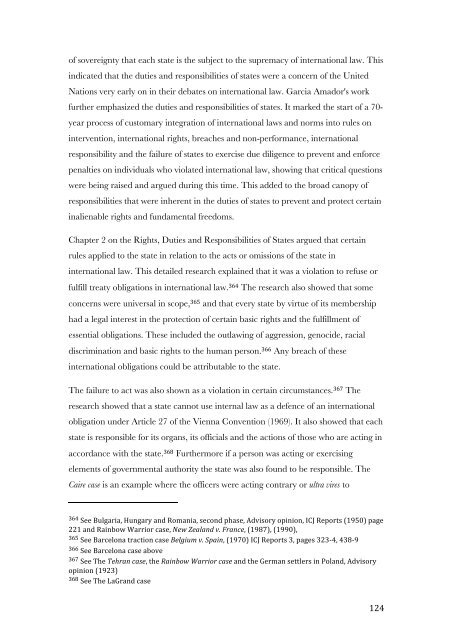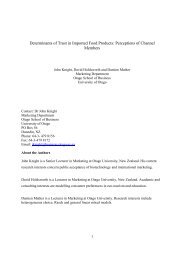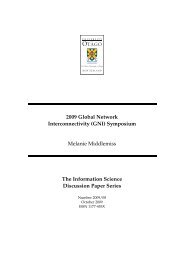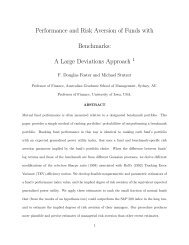Where is R2P grounded in international law? Anne-Marie Judson A ...
Where is R2P grounded in international law? Anne-Marie Judson A ...
Where is R2P grounded in international law? Anne-Marie Judson A ...
Create successful ePaper yourself
Turn your PDF publications into a flip-book with our unique Google optimized e-Paper software.
of sovereignty that each state <strong>is</strong> the subject to the supremacy of <strong>in</strong>ternational <strong>law</strong>. Th<strong>is</strong><br />
<strong>in</strong>dicated that the duties and responsibilities of states were a concern of the United<br />
Nations very early on <strong>in</strong> their debates on <strong>in</strong>ternational <strong>law</strong>. Garcia Amador's work<br />
further emphasized the duties and responsibilities of states. It marked the start of a 70-<br />
year process of customary <strong>in</strong>tegration of <strong>in</strong>ternational <strong>law</strong>s and norms <strong>in</strong>to rules on<br />
<strong>in</strong>tervention, <strong>in</strong>ternational rights, breaches and non-performance, <strong>in</strong>ternational<br />
responsibility and the failure of states to exerc<strong>is</strong>e due diligence to prevent and enforce<br />
penalties on <strong>in</strong>dividuals who violated <strong>in</strong>ternational <strong>law</strong>, show<strong>in</strong>g that critical questions<br />
were be<strong>in</strong>g ra<strong>is</strong>ed and argued dur<strong>in</strong>g th<strong>is</strong> time. Th<strong>is</strong> added to the broad canopy of<br />
responsibilities that were <strong>in</strong>herent <strong>in</strong> the duties of states to prevent and protect certa<strong>in</strong><br />
<strong>in</strong>alienable rights and fundamental freedoms.<br />
Chapter 2 on the Rights, Duties and Responsibilities of States argued that certa<strong>in</strong><br />
rules applied to the state <strong>in</strong> relation to the acts or om<strong>is</strong>sions of the state <strong>in</strong><br />
<strong>in</strong>ternational <strong>law</strong>. Th<strong>is</strong> detailed research expla<strong>in</strong>ed that it was a violation to refuse or<br />
fulfill treaty obligations <strong>in</strong> <strong>in</strong>ternational <strong>law</strong>. 364 The research also showed that some<br />
concerns were universal <strong>in</strong> scope, 365 and that every state by virtue of its membership<br />
had a legal <strong>in</strong>terest <strong>in</strong> the protection of certa<strong>in</strong> basic rights and the fulfillment of<br />
essential obligations. These <strong>in</strong>cluded the out<strong>law</strong><strong>in</strong>g of aggression, genocide, racial<br />
d<strong>is</strong>crim<strong>in</strong>ation and basic rights to the human person. 366 Any breach of these<br />
<strong>in</strong>ternational obligations could be attributable to the state.<br />
The failure to act was also shown as a violation <strong>in</strong> certa<strong>in</strong> circumstances. 367 The<br />
research showed that a state cannot use <strong>in</strong>ternal <strong>law</strong> as a defence of an <strong>in</strong>ternational<br />
obligation under Article 27 of the Vienna Convention (1969). It also showed that each<br />
state <strong>is</strong> responsible for its organs, its officials and the actions of those who are act<strong>in</strong>g <strong>in</strong><br />
accordance with the state. 368 Furthermore if a person was act<strong>in</strong>g or exerc<strong>is</strong><strong>in</strong>g<br />
elements of governmental authority the state was also found to be responsible. The<br />
Caire case <strong>is</strong> an example where the officers were act<strong>in</strong>g contrary or ultra vires to<br />
364 See Bulgaria, Hungary and Romania, second phase, Adv<strong>is</strong>ory op<strong>in</strong>ion, ICJ Reports (1950) page <br />
221 and Ra<strong>in</strong>bow Warrior case, New Zealand v. France, (1987), (1990), <br />
365 See Barcelona traction case Belgium v. Spa<strong>in</strong>, (1970) ICJ Reports 3, pages 323-‐4, 438-‐9 <br />
366 See Barcelona case above <br />
367 See The Tehran case, the Ra<strong>in</strong>bow Warrior case and the German settlers <strong>in</strong> Poland, Adv<strong>is</strong>ory <br />
op<strong>in</strong>ion (1923) <br />
368 See The LaGrand case <br />
<br />
124
















